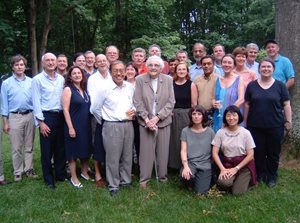The Society mourns the loss of biochemist and parasitologist Ching. C. Wang, PhD, who passed away on August 22, 2017. Among his many accomplishments, Dr. Wang was instrumental in discovering the mechanism of action of the important nematocide ivermectin while working in the Parasitology Division of Merck & Co. in the 1970’s.
The following tribute was written by former ASTMH President Stephanie James, PhD, FASTMH, and member Michael Gottlieb, PhD.
 Dr. Wang with the TMP study section, 2004 Dr. Wang with the TMP study section, 2004 |
C.C. was born in Beijing in 1937 and spent his early childhood under harsh conditions, fleeing from the Japanese invasion during World War II. His family settled in Taiwan in 1949, where he obtained his bachelor’s degree in chemistry from National Taiwan University. In 1960, he moved to the U.S. to pursue a PhD in biochemistry at the University of California, Berkeley. There he met his future wife and scientific partner, Alice. He took the position at Merck following postdoctoral fellowships at Columbia University and Princeton University. He then made the transition from industry back to academia in 1981, accepting an offer to join the University of California, San Francisco. He spent the remainder of his long career at UCSF as a Professor of Chemistry and Pharmaceutical Chemistry, where – with Alice – he focused primarily on giardiasis and trypanosomiasis.
He was not only an accomplished researcher; C.C. served his professional community in many ways. He was a longtime member of NIH’s Tropical Medicine and Parasitology (TMP) study section. He was a faculty member of the Woods Hole Biology of Parasitism course. He chaired the Chemotherapy of African Trypanosomiasis and Integrated Chemotherapy Steering Committees at WHO in the 1990’s. He was a member of the Board of Directors of the International Laboratory for Research on Animal Diseases from 1989 to 1995, and was on the editorial boards of multiple scientific journals. Closer to home, he and Alice were known for co-hosting (with colleagues from Stanford) the monthly Bay Area Parasitology Club for some 25 years. Throughout his life, he retained an interest in supporting scientific development in Taiwan, where within the Academica Sinica he established a molecular parasitology research program at the Institute of Biomedical Sciences and later helped to create the Institute of Molecular Biology.
C.C. retired in 2011, becoming Professor Emeritus at UCSF. While maintaining his keen interest in research, he and Alice enjoyed traveling the world and chronicling their exploits in holiday cards sent to their many friends. In his final years, he fought a lengthy battle against cancer. He leaves behind his brother, Peter Wang, wife Alice Lee Wang, daughter Charlotte Wang, son-in-law Shawn Fessler and grandchildren Mitchell and Alicia Fessler.
C.C. will be greatly missed for his keen dedication to drug development for parasitic diseases, his ebullient personality and his unforgettable smile.
Read more about Dr. Wang's life here.